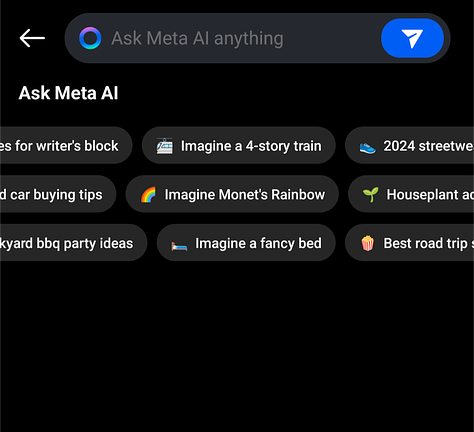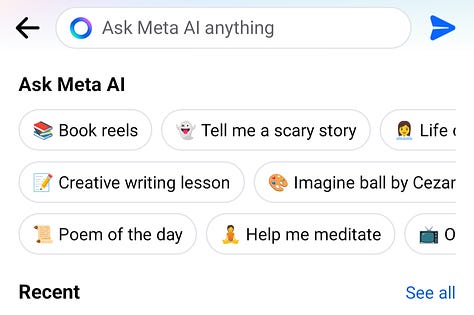Meta could threaten Google's search crown
ChatGPT lacks the one thing Meta has that can match Google
This week’s newsletter is sponsored by the Digital PR agency Search Intelligence, which uses PR methods to grow a link portfolio and North Star Inbound, which is a recommended agency for penalty recovery. See their case studies linked in the newsletter.
I will be in Southeast Asia in July. If you are in Jakarta, please join me here!
Please reply for details on events in Singapore and Bangkok.
The common wisdom is that ChatGPT or a similar-positioned search engine is a serious threat to Google, and in my past newsletters, I have argued that this is why Google is pushing so hard on generative AI in search results to prove their relevancy in an AI-first world.
There is a new threat
In recent weeks, my opinion has changed dramatically. Meta is the force that could potentially unseat Google. As I explain my reasoning, you will hopefully see how Meta and even Apple could eventually pose a threat, too.
In the early days of search, Google beat out its competitors - and there were many (beyond just Microsoft and Yahoo)- with three particular angles of attack.
[SPONSORED by Search Intelligence]
Our company landed massive links for our baggage client with Digital PR, by analysing government datasets.
Methodology:
✅ We analysed data from the US Department of Transport Air Travel Consumer Report.
The data included the total number of bags, wheelchairs, and scooters enplaned from January 2021 to January 2024.
✅ This was then compared to the total number of reports of these items being mishandled.
American Airlines has mishandled the most baggage of any airline in America with 1,750,009 reports. This is 8.71 bags per 1,000 enplaned.
The second airline mishandling the most baggage is Envoy Airlines, while third is Republic Airways……
Google was cost-efficient
While the competition scaled with massive investments in costly technology, Google figured out how to do more with less. This allowed them to crawl the deepest recesses of the web and index pages that the competition did not know about. This led to a superior product that initially attracted its user base.
Google had a superior product
The competition focused on winning market share by promoting subpar products: Yahoo, AOL, Microsoft, Lycos, and others, which had ads everywhere, event sponsorships, and even Superbowl partnerships.
Google grew by word of mouth because its index strived to give users the best results through its PageRank algorithm.
Clean UX attracted users
In the early days of search and Google, Google did only one thing—search. They got users searching and loving their experiences so they would keep coming back. Even when Google launched its ads product, it was meant to be as unobtrusive as possible to the search experience.
In 2024, these are advanatages no longer
These three advantages left their competitors in the dust even when the competition equalized. The cost of crawling the internet has gotten so low that startups and bootstrapped companies can build indexes of the entire internet without raising substantial sums. The same applies to the product, where in blind taste tests, most users can’t identify which result came from Google or another search engine.
Distribution is Google’s only advantage
Today, the not-so-secret secret to Google’s dominance is distribution. During the anti-trust trials against Google, we learned that Google spends billions of dollars every year to be the default search engine on iOS devices. Google uses its Chrome browser and its 3 billion Android devices to keep the world using Google.
This distribution powerhouse has even worked against Microsoft, which dominates the desktop device market. The majority of their users use the Microsoft Edge browser just once to download Chrome and become Google users. (Windows has a 74% market share, while its Edge browser has only 5% of the market, compared to 65% for Chrome. )
A great reason for the continued desktop dominance of the search market despite this small hurdle of needing to download Chrome is likely that, on mobile, there is no friction whatsoever. Most phones are unboxed defaulted to Google.
Meta has distribution
With this background in mind, I think Meta poses a serious threat to Google. Meta has distribution through its Whatsapp, Instagram, and Facebook platforms. According to Meta’s latest earnings report, they had 3.25 billion daily active people (the metric others call DAU). That is mind-blowing distribution that is only rivaled by Google.
While Meta hasn’t yet delved deep into information discovery instead of just being a social network, its surface-level attempts show the power of what it can do. Today, if you go into WhatsApp to search for a contact or conversation, Meta suggests doing a discovery search.
The same happens on the Facebook and Instagram mobile apps.



In my testing, each of these “discovery searches” results in an AI-generated answer and ends with a Google search. Unless Google has inked a deal like they do with Apple to keep those searches going to Google, Meta can start bringing those Meta searches to its own results page.
Unlike Apple, which would have to build a massive advertising business to make these searches worthwhile, Meta already has one. (Not having a full search business shouldn’t make Google execs sleep more comfortably because, as Apple announced at WWDC, they now have an AI solution, too.)
Just like Google, Meta has substantial distribution and can hijack existing searches into Meta searches, and Meta’s robust ad network means they can profit from this, too.
Other challengers lack distribution
I am not convinced that ChatGPT or Perplexity could unseat Google due to their distribution challenges, but this is where Meta could shine.
Stealing Google’s crown doesn’t have to mean taking 51% of the search market; shaving a few percentage points off of their share could be catastrophic. Additionally, as Meta made users more accustomed to using the Meta platform for information discovery, they could grow their reach in all places Google built dominance.
Local as an opportunity
Facebook pages have lost popularity as the Facebook ecosystem declined. Still, a reinvigorated Meta (verse) injected with search would make these pages relevant again in a way that would threaten Google’s local pages. While I have no sources that confirm that any of this is true, believing that ChatGPT and similar pose the greatest threat to Google assumes that information discovery remains unchanged and that it’s just a matter of the platform switching to a better product.
I don’t think it’s safe to make any of those assumptions. The introduction of LLMs into the buyer journey changes everything. While it might not be likely, it is not impossible that a year from now, we will not be Googling to find out where to go for dinner, who won the game last night, and what the capital of Nebraska is.
For the marketer, the best way to prepare for the uncertain future is to assume that everything can change and prepare for that possibility.
Today, Meta appears to be a threat; tomorrow, it could be Apple or even Amazon.
[Sponsored by North Star Inbound ]
This is the exact playbook we ran for a dental client.
In a few short months, the results was:
$139,801 in revenue.
Old SEO playbook:
Create 1000s of pages and rank for millions of keywords.
Alienate users with mass-produced content.
Buy links, run link exchanges, scale your guest posting to boost your rankings so more people can check out the bad mass-produced pages.
New SEO playbook:
Create 100 pages that are best in class, help users solve their problems, honestly present various solutions, and position you as a great option.
Keep those pages up to date be refreshing content regularly.
Create original research and thought leadership content that builds your brand while attracting journalists who want to write about your content.
People who find your pages organically immediately feel served by the content and develop a positive association with your brand. They convert at a higher level or place you on a shortlist.
Get your New SEO Playbook.





Nice article and predictions too. I already use my iOS chat gpt app like I used to use Google so I bet you’re right
The Facebook ecosystem will continue to decline despite what they do with AI for Search. Meta seems to have an issue chasing new shiny as their flagship product rots on the vine. If they wanted to stop the bleed, they'd be better off doing something about content moderation. Users are souring to constant spam/fraud... Hacked accounts posting scams, and armies of visibly fake profiles posting air duct cleaning (or car detailing or logo design or or or) spam. Never mind the ads about getting $750 deposited to your cashapp or the ads that lead straight to malicious websites/phishing scams flagged by ESET/Symantec/others tools.
They put all this money and time into ramping up a chatbot because everyone else has a chatbot and it's the thing to do. Meanwhile, their content moderation tools keep getting worse and continue to erode user trust in the platform. Oddly enough, if you copy paste common scam or spam scripts found on Facebook into Meta AI and ask if if the content is safe or not, Meta AI does very well at identifying malicious content (air duct cleaning scams, common advance fee scams, etc.). Report those same posts to Facebook and fill your Support inbox with a bunch of "We use a combination of technology and human reviewers to process reports and identify content that goes against our Community Standards. In this case, we did not remove the content you reported." messages.